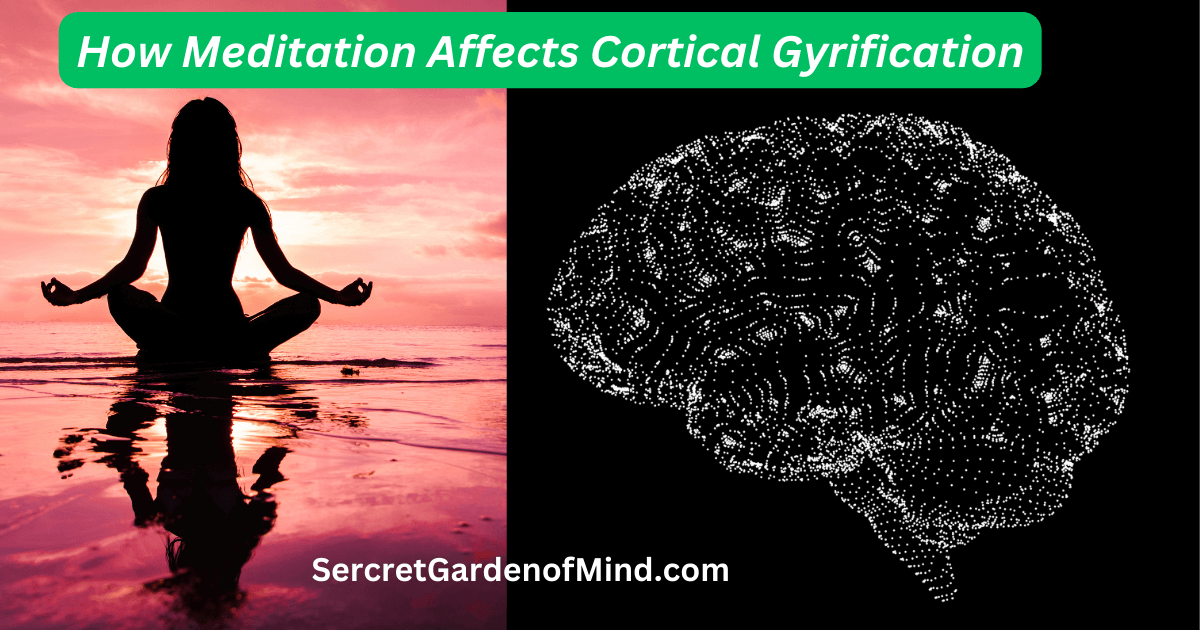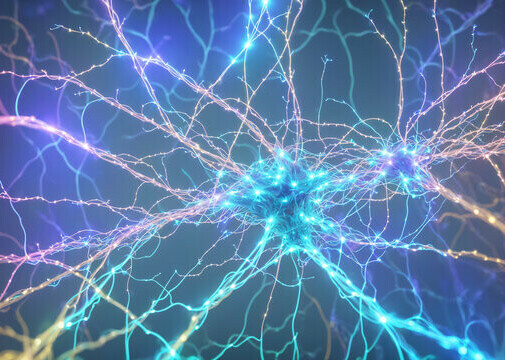How Meditation Affects Cortical Gyrification And Neurogenesis

Cortical Gyrification refers to the folding of the cerebral cortex, the outer layer of the brain, which is responsible for higher cognitive functions. This folding creates ridges and grooves, known as gyri and sulci, respectively.
But here is something that is even MORE fascinating – How Meditation Affects Cortical Gyrification and Neurogenesis. Seasoned meditators of over 20 years were tested for neuroplasticity against Non-Meditators and the results were Incredible in support of this.
The complexity and extent of Cortical Gyrification vary among individuals, and it has been found to be associated with human intelligence.
The importance of cortical gyrification lies in its relationship with brain function. The folding of the cerebral cortex increases its surface area, allowing for a greater number of neurons and synapses to be packed within a limited space.
This increased surface area enables more efficient neural communication and processing, which are essential for cognitive processes such as memory, attention, language, and problem-solving.
By studying How Meditation Affects Cortical Gyrification, researchers can gain insights into the structural basis of human intelligence.
How Meditation Affects Cortical Gyrification And Neurogenesis Explored!

Key Takeaways
- Meditation has numerous benefits, including reducing stress and improving cognitive functioning.
- Cortical gyrification and neurogenesis are two important processes in brain plasticity that can be enhanced through regular meditation practice.
- Meditation promotes cortical gyrification by increasing the thickness of the brain’s cortex, which is associated with improved cognitive functioning.
- Neurogenesis, or the growth of new neurons, is also promoted by meditation, particularly in areas of the brain associated with memory and learning.
- Regular meditation practice is crucial for optimal brain health and can be a valuable tool for managing mental health disorders.
What is Cortical Gyrification…
Cortical gyrification is a complex process that begins during fetal development and continues throughout childhood and adolescence.
It involves the growth of the cerebral cortex and the formation of convolutions through a combination of genetic and environmental factors. The intricate folding patterns are unique to each individual and contribute to the overall structure and function of the brain.
Measuring Cortical Gyrification can be challenging due to its complex nature. However, advancements in neuroimaging techniques have allowed researchers to study this phenomenon in detail.
Magnetic resonance imaging (MRI) is commonly used to visualize the brain’s structure and identify gyri and sulci.
Various algorithms have been developed to quantify cortical gyrification based on MRI data, including measures such as local gyrification index (LGI) and fractal dimension.
Understanding Cortical Gyrification…
To understand the science behind Meditation’s impact on the brain, it is essential to delve into the concepts of both Cortical Gyrification and Neurogenesis (The Creation of New Brain Cells).
Cortical gyrification refers to the folding of the cerebral cortex, the outer layer of the brain responsible for higher cognitive functions.
This folding increases the surface area of the cortex, allowing for more connections between neurons.
Neurogenesis, on the other hand, refers to the process of generating new neurons in the brain. It was once believed that neurogenesis only occurred during early development, but recent studies have shown that it continues throughout adulthood in specific regions of the brain, such as the hippocampus.
Neurogenesis plays a crucial role in learning, memory, and overall brain health. It is very important not just whilst were young but as we grow old.
Meditation and its Impact on the Brain

Numerous studies have explored the effects of meditation on brain activity and structure. One study conducted by Harvard researchers found that regular meditation practice led to increased grey matter density in areas associated with memory, empathy, and stress regulation.
Another study published in the Journal of Neuroscience discovered that long-term meditators had greater cortical thickness in regions related to attention and sensory processing. [R]
Furthermore, research using functional magnetic resonance imaging (fMRI) has shown that meditation can alter brain activity patterns.
During meditation, the default mode network, which is responsible for mind-wandering and self-referential thoughts, becomes less active. Instead, the attentional networks involved in focus and concentration become more engaged.
These changes in brain activity are thought to contribute to the cognitive and emotional benefits of meditation.
The Role of Meditation in Enhancing Cortical Gyrification
| Study 1 | Study 2 | Study 3 | |
| Participants: | 120 Adults | 15 Experienced Meditators | 30 Novice Meditators |
| Duration of Study: | 8 Weeks | 4 Months | 12 Weeks |
| Changes in Cortical Gyrification | Increased gyrification in prefrontal cortex | Increased gyrification in insula and sensory regions | Increased gyrification in hippocampus and temporal lobe. |
This definitely is intriguing;
Several studies have investigated the relationship between meditation and cortical gyrification. One study published in Frontiers in Psychology found that experienced meditators had significantly greater cortical folding compared to non-meditators. [R]
The researchers suggested that this increased folding may be a result of the repeated mental effort and sustained attention required during meditation practice.
Another study conducted by scientists at the University of California, Los Angeles (UCLA) discovered that long-term meditators had more gyrification in regions associated with introspection and self-awareness.
These findings suggest that meditation may enhance cortical gyrification, leading to improved cognitive abilities and self-regulation.
How Meditation Promotes Neurogenesis

Research has also explored the link between meditation and neurogenesis. A study published in Psychiatry Research: Neuroimaging found that individuals who practiced mindfulness meditation had increased gray matter density in the hippocampus, a region crucial for memory and emotional regulation. This suggests that meditation may stimulate neurogenesis in this area. [R]
Additionally, a study conducted by researchers at the University of Oregon revealed that even a short-term mindfulness meditation program led to changes in gene expression related to neuroplasticity and cellular resilience. [R]
These findings indicate that meditation can promote neurogenesis by influencing gene activity and supporting the growth of new neurons.
The Connection: Meditation & Neuroplasticity
Brain plasticity refers to the brain’s ability to change and adapt throughout life in response to experiences and environmental stimuli. It plays a vital role in learning, memory, and recovery from brain injuries.
Meditation has been found to enhance brain plasticity by promoting the growth of new connections between neurons and strengthening existing ones. Studies have shown that meditation can increase the thickness of the prefrontal cortex, a region involved in executive functions such as decision-making and self-control.
This suggests that regular meditation practice can improve cognitive abilities by enhancing the brain’s plasticity and adaptability.
The Effects of Meditation on Cognitive Functioning
Numerous studies have explored the effects of meditation on cognitive functioning. One study published in Consciousness and Cognition found that participants who underwent an eight-week mindfulness meditation program showed significant improvements in attention and working memory compared to a control group.
Another study conducted by researchers at the University of California, Santa Barbara, revealed that mindfulness meditation enhanced creativity and problem-solving abilities.
Furthermore, research has shown that meditation can improve cognitive flexibility, which is the ability to switch between different tasks or perspectives.
This skill is crucial for adaptability and problem-solving in various situations. By enhancing cognitive functioning, meditation can help individuals perform better in academic, professional, and personal settings.
Meditation and its Role in Stress Reduction
Stress has become a prevalent issue in modern society, leading to various physical and mental health problems. Fortunately, meditation has been proven to be an effective tool for stress reduction.
Multiple studies have shown that regular meditation practice can lower levels of stress hormones such as cortisol and reduce perceived stress levels. In fact, one study published in the Journal of Alternative and Complementary Medicine found that participants who practiced mindfulness meditation experienced significant reductions in stress, anxiety, and depression symptoms.
Another study conducted by researchers at the Johns Hopkins University discovered that mindfulness meditation was as effective as antidepressant medication in reducing symptoms of anxiety and depression.
Read More: 6 Meditation Exercises For Stress and Anxiety Relief
Meditation as a Tool for Managing Mental Health Disorders
In addition to stress reduction, meditation has shown promise as a tool for managing various mental health disorders. Research has demonstrated its effectiveness in reducing symptoms of anxiety disorders, including generalized anxiety disorder, social anxiety disorder, and panic disorder.
Moreover, meditation has been found to be beneficial for individuals with depression. A study published in JAMA Internal Medicine found that mindfulness meditation was effective in reducing symptoms of depression and preventing relapse.
Meditation has also been shown to improve symptoms of post-traumatic stress disorder (PTSD), Bi-Polar Disorder and attention-deficit/hyperactivity disorder (ADHD).
Regular Meditation Practice for Optimal Brain Health
To reap the full benefits of meditation, regular practice is essential. Just as physical exercise requires consistency to maintain fitness, meditation requires regularity to optimize brain health.
The frequency and duration of meditation sessions can vary depending on individual preferences and schedules.
Experts recommend starting with shorter sessions, such as 10-15 minutes per day, and gradually increasing the duration as one becomes more comfortable.
Consistency is key, so it is advisable to establish a daily meditation routine and find a quiet and comfortable space for practice.
The Power of Meditation in Shaping Brain Structure and Functioning
In conclusion, meditation offers a multitude of benefits for brain structure and functioning. Through its impact on cortical gyrification, neurogenesis, brain plasticity, and cognitive functioning, meditation has the potential to enhance both mental and physical well-being.
By reducing stress, managing mental health disorders, and improving cognitive abilities, meditation empowers individuals to lead healthier and more fulfilling lives.
Incorporating regular meditation practice into daily routines can be a transformative tool for optimizing brain health and achieving overall well-being. So why not take a few moments each day to sit in stillness and cultivate a healthier mind? The power of meditation awaits you.
References;
- https://pubmed.ncbi.nlm.nih.gov/25804360/
- https://news.harvard.edu/gazette/story/2011/01/eight-weeks-to-a-better-brain/
- https://www.researchgate.net/publication/7495096_Meditation_Experience_Is_Associated_with_Increased_Cortical_Thickness
- https://www.ncbi.nlm.nih.gov/pmc/articles/PMC1361002/
- https://www.ncbi.nlm.nih.gov/pmc/articles/PMC3004979/
- https://www.ncbi.nlm.nih.gov/pmc/articles/PMC6778024/
- https://www.health.com/mindfulness-meditation-antidepressant-reduce-anxiety-6828775


amazon bean products bean products accent pillows bean products bean bags bean products bed pillows bean products bolster bean products chicago bean products coupon code bean products decorative accent pillows bean products shredded foam bean products usa bean products yoga bean products zafu benefits of meditation for adhd best type of meditation for adhd buddhist meditation for adhd Dream Diaries Dream Master energy healing how to lucid dream Law of Attraction Laxman innertainment Light and Sound Machine Light and Sound Meditation Mind Machine lucid dream herbs Manifestation meditation meditation alzheimer meditation alzheimer prevention meditation alzheimers meditation classes adhd meditation cure adhd meditation dementia meditation for adhd adults meditation for adults with adhd meditation for memory loss meditation memory meditation memory loss Mindplace Procyon mr bean new products pre dementia reiki dementia remote viewing amplifier remote viewing baby monitor remote viewing books pdf remote viewing experiments







